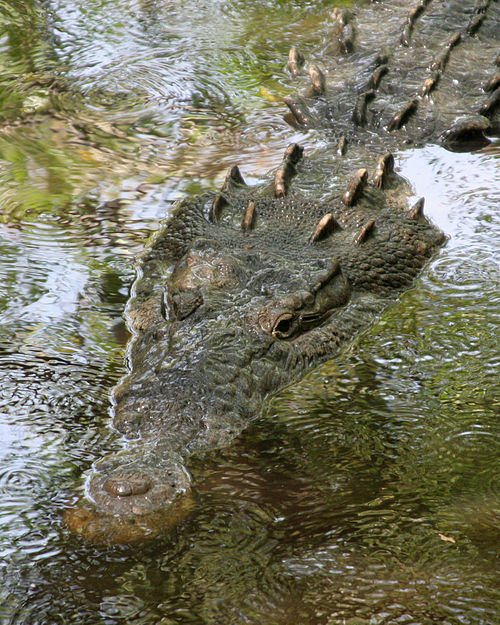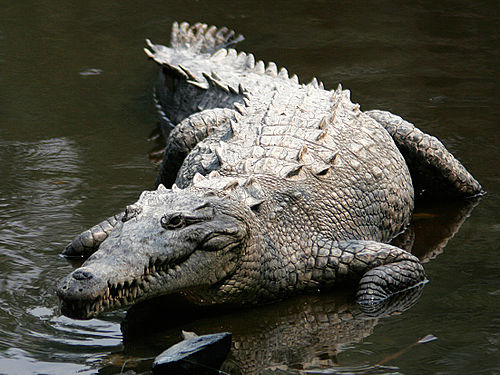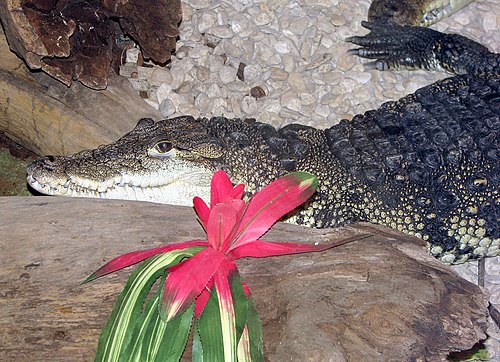Crocodilenoun
Any of the predatory amphibious reptiles of the family Crocodylidae; (loosely) a crocodilian, any species of the order Crocodilia, which also includes the alligators, caimans and gavials.
Crocodilenoun
A long line or procession of people (especially children) walking together.
Crocodilenoun
(logic) A fallacious dilemma, mythically supposed to have been first used by a crocodile.
Crocodileverb
(intransitive) To speak one's native language at an Esperanto-language gathering, rather than Esperanto.
Crocodilenoun
A large reptile of the genus Crocodilus, of several species. They grow to the length of sixteen or eighteen feet, and inhabit the large rivers of Africa, Asia, and America. The eggs, laid in the sand, are hatched by the sun's heat. The best known species is that of the Nile (Crocodilus vulgaris, or Crocodilus Niloticus). The Florida crocodile (Crocodilus Americanus) is much less common than the alligator and has longer jaws. The name is also sometimes applied to the species of other related genera, as the gavial and the alligator.
Crocodilenoun
A fallacious dilemma, mythically supposed to have been first used by a crocodile.
Crocodilenoun
large voracious aquatic reptile having a long snout with massive jaws and sharp teeth and a body covered with bony plates; of sluggish tropical waters
Crocodile
Crocodiles (family Crocodylidae) or true crocodiles are large semiaquatic reptiles that live throughout the tropics in Africa, Asia, the Americas and Australia. The term crocodile is sometimes used even more loosely to include all extant members of the order Crocodilia, which includes the alligators and caimans (family Alligatoridae), the gharial and false gharial (family Gavialidae), and all other living and fossil Crocodylomorpha.
Lizardnoun
Any reptile of the order Squamata that is not a snake, usually having four legs, external ear openings, movable eyelids and a long slender body and tail.
Lizardnoun
Lizard skin, the skin of these reptiles.
Lizardnoun
(colloquial) An unctuous person.
Lizardnoun
(colloquial) A coward.
Lizardnoun
(rock paper scissors) A hand forming a "D" shape with the tips of the thumb and index finger touching (a handshape resembling a lizard), that beats paper and Spock and loses to rock and scissors in rock-paper-scissors-lizard-Spock.
Lizardnoun
(in compounds) A person who idly spends time in a specified place, especially a promiscuous female.
Lizardnoun
Any one of the numerous species of reptiles belonging to the order Lacertilia; sometimes, also applied to reptiles of other orders, as the Hatteria.
Lizardnoun
A piece of rope with thimble or block spliced into one or both of the ends.
Lizardnoun
A piece of timber with a forked end, used in dragging a heavy stone, a log, or the like, from a field.
Lizardnoun
relatively long-bodied reptile with usually two pairs of legs and a tapering tail
Lizardnoun
a man who idles about in the lounges of hotels and bars in search of women who would support him
Lizard
Lizards are a widespread group of squamate reptiles, with over 6,000 species, ranging across all continents except Antarctica, as well as most oceanic island chains. The group is paraphyletic as it excludes the snakes and Amphisbaenia; some lizards are more closely related to these two excluded groups than they are to other lizards.











































